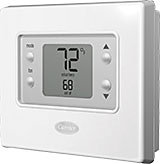5 THERMOSTAT TIPS FOR SAVING MONEY IN FALL AND WINTER

Tired of high winter heat bills? Try these thermostat tips to really save energy in your home!
- Turn the thermostat down in the day
Many families are at work and school during the day, leaving nobody at home. That means that the thermostat doesn't need to be turned up! If this applies to you, think about scheduling your thermostat to turn down, say around 8:00 am every weekday. If your heating fuel is gas, you can lower thermostats by 10 to 15 degrees without making your house too cold (while saving around 10% annually on heating and cooling). Set the thermostat to climb back up when people start getting home, around 4:30 to 5:00pm. If your heating system is an electric heat pump, a much smaller temperture swing is optimum, maybe 3 to 4 degrees. - Turn the thermostat down at night
You may be thinking, "Wait, we're all home at night! Why turn the thermostat down?" But remember, when it's time to sleep you are more likely to be wrapped in thick blankets and pajamas. That means you don't need heating as much: That's why many thermostat tips suggest turning heat down at night too, starting around 10:00 to 10:30pm. - Bundle up and cut a few degrees
We've got a few thermostat tips for when you're home and awake, too! You see, you can save money in the fall and winter just by turning the thermostat down a degree or two. Think about lowering your thermostat a couple degrees and wearing sweaters, socks, or long pants around the house to stay comfortable. Some people prefer to keep the thermostat below 68 degrees, but every little bit helps. - Switch to a smart thermostat for easier programming
A regular thermostat schedule requires you to set specific times throughout the week. A smart thermostat, however, can learn from when people come and go and automatically set the temperature to save as much energy as possible – as well as letting you control it remotely. It's ideal for more complicated work or school schedules. - Help your thermostat out with cheap heating
Open windows during the day to let the sun in and take some pressure off your thermostat. Also try to use natural gas sources of heat when appropriate, like gas fireplaces and heaters. These are very efficient and can help lower your heating bill when used correctly.
As always, visit Ragsdale for more information on heating your home for winter!
Related Reading
Join Our Email Newsletter
Receive updates, current news, promotions, and industry tips.
